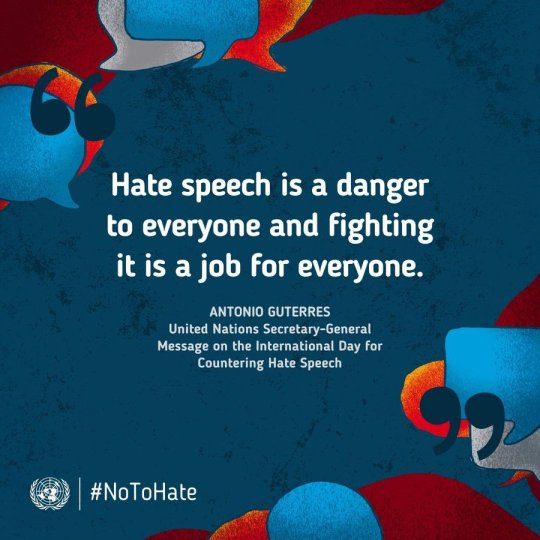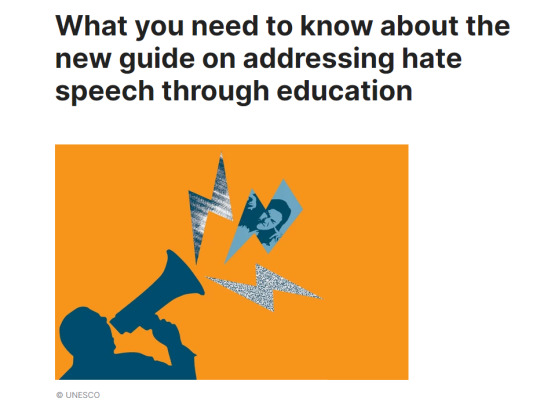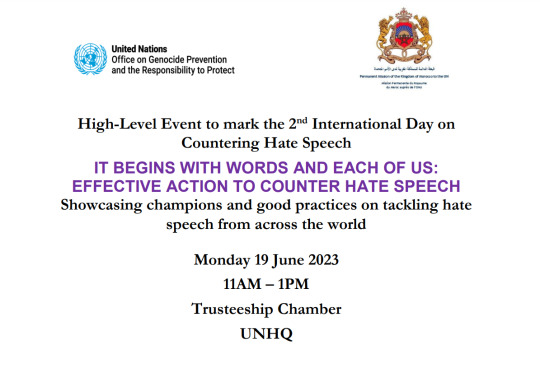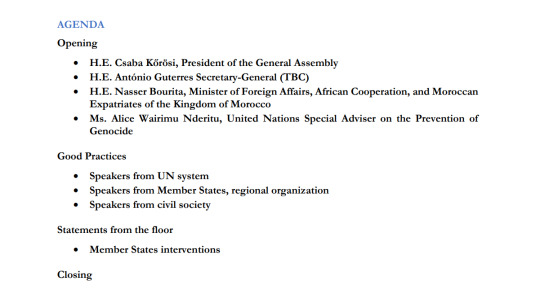Text
Second International Day for Countering Hate Speech: “It Begins With Words and Each of Us: Effective Action to Counter Hate Speech”.
Today, the threat posed by hate speech progressively undermines tolerance, inclusion, and respect for diversity, which not only fuels violent extremism in fragile and conflict areas, but also further undermines social cohesion and political stability in countries across the world. No country is spared. This is also increasingly manifested through political extremism, including right-wing extremism. In fact, the use of dangerous, or hateful speech to disparage individuals and to promote violence against them is growing exponentially online, in parallel with the rise of social media use.
High-Level Panel Discussion.
0 notes
Text
Hate speech is a danger to everyone and fighting it is a job for everyone.

On this International Day for Countering Hate Speech and every day, let’s say "NO TO HATE".
#NoToHate#International Day for Countering Hate Speech#Statements#united nations secretary general#Quotes#end hate speech
0 notes
Text
What efforts are needed to address and counter hate speech more effectively?
A comprehensive response with a whole-of-society approach is essential, with the following vital areas of action to consider:
Establishing the need to combat hate speech as a matter of national and global priority at the highest political levels,
Addressing hate speech in the content of education programmes/curricula and pedagogical approaches at every level of formal, non-formal and informal education, from early childhood through higher education to lifelong learning,
Putting in place effective anti-discrimination policies and strategies,
Developing better reporting mechanisms at the local, national and global levels,
Coordinating improved responses with social media companies,
Encouraging further research on the nature and spread of hate speech and the effectiveness of the responses and mitigation measures implemented by various stakeholders, including in the education sector.
#Social and emotional learning (SEL)#practical tools and techniques#points of view#negative emotions#resolve conflicts#manage stress#hate speech#UNESCO#civic education
0 notes
Text
What does a comprehensive approach look like?
To effectively counter hate speech online and offline and foster a safe and inclusive environment free from all forms of hatred and discrimination, efforts made by educators in the classroom must be reflected in all aspects of school life, including policies, extracurricular activities, sports, and social and cultural events. Active engagement of teachers, administration, and parents is a critical success determinant.
The private sector has a role to play, too. Internet companies can contribute by devoting time and resources in risk assessment mechanisms as well as independent audits of the automated tools that enable the amplification of hate speech. They should consider involving victims, civil society and/or intergovernmental organisations in these processes and in the evaluation of the application of their terms of services. Investment in educational tools that enable users to recognise and respond to disinformation is also among the measures that could be taken to address hate speech.
0 notes
Text
How can teachers create an alternative sense of belonging?
To complement curricular interventions, a safe, caring, inclusive, and collaborative classroom climate is necessary. Hate can give a sense of purpose and belonging. It is, therefore, crucial to invest in building a sense of community in and out of schools and integrate missing perspectives in the education process.
Programmes that support global citizenship education and promote collaborative, culturally responsive and inclusive practices can help to develop the necessary knowledge and competence to embrace differences and engage respectfully in a diverse society. Social and emotional learning (SEL) provides practical tools and techniques that teachers can help use to foster a sense of belonging amongst learners. By using case studies and real-life scenarios to discuss controversial situations and different points of view, learners are able to manage stress and negative emotions, acknowledge their strengths and weaknesses, and resolve conflicts.
#Social and emotional learning (SEL)#practical tools and techniques#points of view#negative emotions#resolve conflicts#manage stress#hate speech#UNESCO#hate discourse#hatred
0 notes
Text
What are the ways to spot and counter hateful narratives within curricula?
One-sided narratives that fuel hate speech and justify exclusion can be found across different subjects and educational programmes. Discussing these narratives with school students and acknowledging their problematic nature is integral to the solution.
This includes facilitating uncomfortable conversations about social inequality and power dynamics, decoding and debunking stereotypes and prejudice, and addressing the trauma and stigmatization caused by violent pasts. Teaching and learning about these issues and revising and reviewing curricula and educational materials can sensitize learners to contemporary forms of discrimination and increase their understanding of the processes that lead societies to violence.
#hate speech narratives#hateful narratives#violence#social inequality#unesco#uncomfortable conversations
0 notes
Text
What’s the role of media and information literacy?
In the "attention economy", hate speech narratives are the ones that often seduce the most, offering an easily achievable sense of community and maximized reach of such messages. Learners need to be empowered to understand the mechanisms underpinning the functioning of media and digital platforms and spot the persuasive tactics commonly used to spread conspiracy theories and other forms of disinformation and harmful content. Evidence shows that developing media and information literacy skills makes them less prone to exclusionary and violent extremist ideas. Teachers, in turn, benefit from these discussions to better understand and reflect on learners' experiences from the digital world, where hateful content is virulent as never before.
0 notes
Text
Where do we draw the line between hate speech and free speech?
Hate speech violates the fundamental human rights of the people that are targeted. Opinions may offend, shock or disturb, but they cannot incite violence, hostility and discrimination. In and through education, learners discover how to draw the line between insults and hate speech, as well as understand the consequences and impact of their words and actions on other people. Discouraging the spread of hateful narratives doesn't impede learners' freedom of speech nor the expression of their opinions. On the contrary, education can help uphold this fundamental right by promoting respect, mutual understanding, and a shared sense of humanity.
0 notes
Text
What you need to know about the new guide on addressing hate speech through education?
How can countries worldwide tap into the power of education to counter hate speech online and offline? UNESCO and the United Nations Office on Genocide Prevention and the Responsibility to Protect (UNOSAPG) have jointly developed the first guide for policy-makers and teachers to explore educational responses to this phenomenon and give practical recommendations for strengthening education systems. The guide is part of the implementation of the UN Strategy and Plan of Action on Hate Speech. Here's a glimpse into some of the main ideas of this new tool.

#hate speech online#hate discourse#Educate#Social and emotional learning (SEL)#practical tools and techniques#points of view#negative emotions#resolve conflicts#manage stress#hate speech#civic education#UNESCO
0 notes
Text
Learn how UNESCO is supporting educators today in countering hate speech among students.
Moving one step closer to safer, peaceful and inclusive societies starts with addressing Hate Speech in and out of school, online and offline.

#intolerance#counter discrimination#NoToHate#hatred#peaceful and inclusive societies#cyberbullying#cyber harassment#UNESCO#Campaign#out of school#in school#get educated#safer societies
0 notes
Text
Agenda Programme of the 2nd International Day of Countering Hate Speech.


The United Nations Office on Genocide Prevention and the Responsibility to Protect (OSAPG) is the UN system wide focal point for hate speech, including coordinating implementation of the UN Strategy and Plan of Action on Hate Speech. The OSAPG provides support within the UN system, to Member States, regional organization and civil society in their efforts to combat hate speech, in line with the UN Strategy. For example, a key part of the implementation of the Strategy is through the development
by UN Country Teams, Peacekeeping and Special Political Missions of context specific action plans to implement the global Strategy, in partnership with national stakeholders. To date over 20 UN field
presences have developed and are implemented such action plan.
0 notes
Text
"It begins with worlds and each of us: Effective action to counter hate speech."
The objective of the high-level event is to showcase good practices that exist from within the UN system, from Member States, regional organizations, civil society and other relevant stakeholders to tackle hate speech. The good practices will emphasize efforts that deal not only with the impact and spread of hate but also its root causes and drivers. It is further aimed to take stock of some of the challenges and lesson learnt from these initiatives in order to enhance knowledge sharing and to strengthen our collective efforts to address the scourge of hate speech globally.
The high-level event will also feature the launch of a publication developed by OSAPG showcasing some of the good practices from within the UN system, in particular from UN field entities on countering and addressing hate speech.
#United Nations Field entities#United Nations Specialized Agencies#panel discussion#United Nations Trusteeship Council#International Day for Countering Hate Speech#conferences#OSAPG
0 notes
Text
Objectives of the 2nd International Day for Countering Hate Speech.

This high-level event is co-organized by the Permanent Mission of the Kingdom of Morocco to the United Nations and the United Nations Office on Genocide Prevention and the Responsibility to Protect, that is also the United Nations Focal Point on Hate Speech.
Its objectives include to:
Commemorate the 2nd Anniversary of the International Day on Countering Hate Speech, and bringing attention to the importance of tackling hate speech in all its forms and manifestations.
Showcasing good practices and examples of efforts to combat hate speech from UN, Member States, regional organizations, civil society and other actors with the aim to support knowledge
sharing and exchange on share lessons learnt. It is also aimed to take stock of and highlight recommendations for additional efforts that can enable holistically addressing and countering hate
speech, both online and offline.
#United Nations Office on Genocide Prevention and the Responsibility to Protect#united nations field entities#united nations specialized Agencies#harmonious coexistence#hate spreading online#un office of the special adviser on the prevention of genocide (osapg)#International Day for Countering Hate Speech#18 june#United Nations Focal Point on Hate Speech
0 notes
Text
UNFPA is part of a global movement to address gendered hate speech online.
Hate speech is in full attack mode, amplified by new technologies that spread divisive rhetoric across the globe. We all have seen the harm it does, sparking violence, exclusion, discrimination, inequality.
In response to growing xenophobia, racism, intolerance, misogyny, anti-semitism and anti-Muslim hatred, United Nations Secretary-General António Guterres launched the UN Strategy and Plan of Action on Hate Speech in June 2019, defining hate speech as “any kind of communication in speech, writing or behaviour that attacks or uses pejorative or discriminatory language with reference to a person or a group on the basis of who they are – in other words, based on their religion, ethnicity, nationality, race, color, descent, gender or other identity factor.”
The action plan aims to enhance UN efforts to address root causes and drivers of hate speech and to enable effective responses to the impact of hate speech on societies, while implementing strategies in line with the right to freedom and expression.
Hate speech poisons minds. It is among the most virulent forms of misinformation, feeding on and fueling social polarization, driving us farther apart. Used for control and oppression, it can lead in the worst cases to mass murder and genocide. Misogynistic hate speech especially is proliferating, with technology providing cheap and easy means to spread hate speech far and wide. Online platforms provide few safeguards to stop it.
Online hate speech in particular might seem impossible to stop, but governments, civil society and individuals are taking action, including tapping the power of education, to fight back. Tackling the issue from an educational perspective involves strengthening educational policies and initiatives with specific measures to address and counter hate speech, helping people develop critical thinking and become active citizens who support peace and human rights.
We can all make online platforms safer. Technology companies must take all necessary steps to stop hate speech, including adopting safety features to limit misinformation and online violence and protect personal data. Safety improves when tech companies deliberately manage gender-specific threats and include women and girls in the design and development of technology. Governments and industry associations should set and enforce regulations to make technology safer. Individuals can stop the hate in their own online practices and call on others to do the same.
UNFPA is part of a global movement to address gendered hate speech online. It co-convenes the Advisory Group to the Global Partnership for Action on Gender-Based Online Harassment and Abuse, and issued the UNFPA Guidance on Safe and Ethical Technology for Gender-Based Violence and Harmful Practices.
For a deeply personal perspective, the UNFPA campaign The Virtual is Real focuses on digital violence – which includes online hate speech that serves to terrorize, dehumanize and silence – and features women who fought back.
Hate speech must not – and will not – win. But we all need to become involved, getting educated and speaking out firmly to counter this growing global scourge. “Hate is hate. We can’t excuse it. We can’t ignore it,” UNFPA Executive Director Dr. Natalia Kanem says in this powerful video. “Hate is actions. Hate is words. Hate is words that become actions.” Say #NoToHate.
International Day for countering Hate Speech 2023, june 18th.
#hate speech online#global Movement#notohate#campaign#International Day for Countering Hate Speech#united nations population fund#UNFPA
0 notes
Text
Say no to war.
“As a man of faith, I believe that peace is God’s dream for humanity. Yet sadly I note that because of war, this wonderful dream is becoming changed into a nightmare,” Guteress said.
"The time has come to say an emphatic ‘no’ to war, to state that wars are not just, but only peace is just: a stable and lasting peace, built not on the precarious balance of deterrence, but on the fraternity that unites us.”
#united nations security council#united nations secretary general#armed conflict#bring humanity closer#harmonious coexistence
0 notes
Text
‘Famine of fraternity’.
Archbishop Paul Richard Gallagher of the Holy See delivered remarks on behalf of Pope Francis. He lamented that even though the globalized world has brought humanity closer, it has not made us any more fraternal.
“Indeed, we are suffering from a famine of fraternity, which arises from the many situations of injustice, poverty and inequality and also from the lack of a culture of solidarity,” he remarked.
The worst effect of this famine is armed conflict and war, according to the English priest, who serves as the Vatican’s Secretary for Relations with States and International Organizations.
0 notes
Text
Concern for humanity.
The Grand Imam underlined the need to continue advocating for peace and love. He also called for opposing hate speech, the manipulation of religion and doctrines to ignite wars among nations, and instilling fear and terror in the hearts of people.
He said this was the mission pursued by Al Azhar Al-Sharif, in partnership with the Catholic Church, Western and Eastern Churches, and other religious institutions, in a collective effort to revive the culture of dialogue among followers of religions and to consolidate the principles of peace and harmonious coexistence.
“Our gathering today is not a luxury, but a necessity, dictated by concern for the future of humanity,” he said. “We are seeking a solution to its complex crisis which has begun to expand and infiltrate, warning of severe consequences if allowed to persist on this disastrous path.”
0 notes